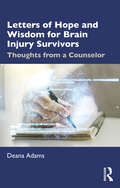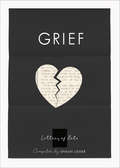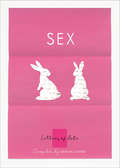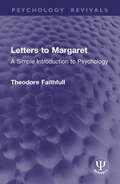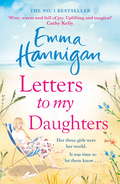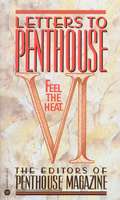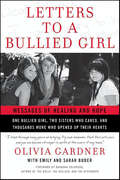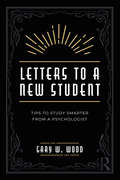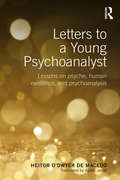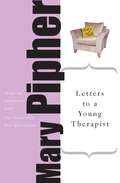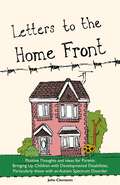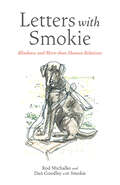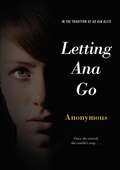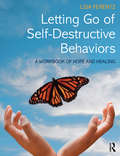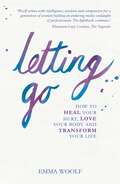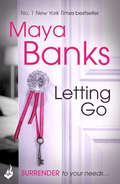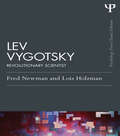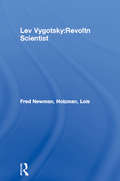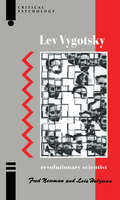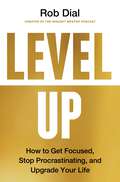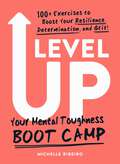- Table View
- List View
Letters of Hope and Wisdom for Brain Injury Survivors: Thoughts from a Counselor
by Deana AdamsLetters of Hope and Wisdom for Brain Injury Survivors: Thoughts from a Counselor offers a personal, informal and spiritual perspective on how to manage the multiple issues related to brain injury. Written by a counsellor who draws on first hand experiential testimonies and insights, each chapter offers a personal letter to the survivor addressing the various issues stemming from a brain injury, along with practical applications suggested for recovery.The book offers a general overview of brain injury and how each part of the brain may be affected. Mental health issues such as depression, anxiety, anger, fear, post-traumatic stress, and grief are described from the perspectives of both the survivor and the family members, and the book also includes strategies on improving self-esteem and gaining new purpose after a brain injury. Additionally, practical coping skills are explained such as how to deal with sensory overload, adjusting the pace of life, and managing family events. Each chapter also offers a homework section that gives the reader additional exercises to complete.It is valuable reading for brain injured survivors seeking holistic wellbeing, and their family members to help them navigate what lies before them. It also serves as an additional source of therapy for clinicians, counselors and upper-level graduate students.
Letters of Note: Grief
by Shaun UsherAn immensely moving collection of letters on the theme of Grief, curated by the founder of the globally popular Letters of Note website.The first volume in the bestselling Letters of Note series was a collection of hundreds of the world's most entertaining, inspiring, and unusual letters, based on the seismically popular website of the same name--an online museum of correspondence visited by over 70 million people. From Virginia Woolf's heartbreaking suicide letter, to Queen Elizabeth II's recipe for drop scones sent to President Eisenhower; from the first recorded use of the expression 'OMG' in a letter to Winston Churchill, to Gandhi's appeal for calm to Hitler; and from Iggy Pop's beautiful letter of advice to a troubled young fan, to Leonardo da Vinci's remarkable job application letter. Now, the curator of Letters of Note, Shaun Usher, gives us wonderful new volumes featuring letters organized around a universal theme. In this volume, Shaun Usher turns to the theme of grief. Contributors to be confirmed.
Letters of Note: Sex (Letters of Note #12)
by Shaun UsherA surprising and varied collection of letters on the subject of sex curated by the founder of the globally popular Letters of Note website. The first volume in the bestselling Letters of Note series was a collection of hundreds of the world's most entertaining, inspiring, and unusual letters, based on the seismically popular website of the same name--an online museum of correspondence visited by over 70 million people. From Virginia Woolf's heartbreaking suicide letter, to Queen Elizabeth II's recipe for drop scones sent to President Eisenhower; from the first recorded use of the expression 'OMG' in a letter to Winston Churchill, to Gandhi's appeal for calm to Hitler; and from Iggy Pop's beautiful letter of advice to a troubled young fan, to Leonardo da Vinci's remarkable job application letter. Now, the curator of Letters of Note, Shaun Usher, gives us wonderful new volumes featuring letters organized around a universal theme. In this volume, Shaun Usher turns to the subject of sex. Includes letters by John Cheever, Dorothy Day, Frida Kahlo, Margaret Mead, Henry Miller, Anaïs Nin, Mae West and many more.
Letters to Judy: What Kids Wish They Could Tell You
by Judy BlumeIn 2,000 letters every month, young people everywhere open their hearts to Judy Blume. Now, in her most special and caring book yet, Judy shares the deepest concerns of kids and often responds with the experiences that affected her own life, both as a child and as a mother. She helps kids feel less alone, and parents less desperate, by discussing topics such as: sibling rivalry and other difficult relationships; divorce, remarriage and step-parents; families that aren't "like everyone else's;" school and friends; changing bodies; crushes, dating and sexuality; drugs and alcohol; secrets that should be told. LETTERS TO JUDY is a love letter addressed to all of us--to anyone who wants to bridge the gaps among family members, to listen, to share, to understand.
Letters to Margaret: A Simple Introduction to Psychology (Psychology Revivals)
by Theodore FaithfullFirst published in 1941, the original blurb for Letters to Margaret reads: ‘In view of the almost universal ignorance of the most elementary biological and psychological facts of life amongst adults, and waste of time and energy amongst children in attempts to acquire surreptitiously the knowledge necessary to them, the author has supplied the need in this book. Drawing upon a fund of material accumulated over twenty years of work for difficult children, he gives in the form of letters to a girl on the threshold of adolescence answers to many questions which puzzle the eager minds of boys and girls. He traces the course of normal growth from birth to the age of twenty-five, and shows how the male and female elements combine to form the human personality. In a small compass he has given parents and teachers a book which will help children reach maturity ready to take an adult part in life. With this volume on their own shelves children will have no need to search the Bible for stray allusions to the act of reproduction, or borrow surreptitiously the volume on “advice to parents” supposedly kept beyond their reach.’ Today it can be read in its historical context.This book is a re-issue originally published in 1941. The language used and views portrayed are a reflection of its era and no offence is meant by the Publishers to any reader by this re-publication.
Letters to My Daughters
by Emma Hannigan** THE NUMBER ONE BESTSELLER **Some books are guaranteed to break your heart - and put it back together again. Letters to my Daughters is one of those wonderful books. Throughout their lives, the three Brady sisters have always been closer to their nanny May than to their own mother, Martha a busy midwife. May always thought of them as her daughters so when she dies suddenly, the sisters are left devastated -- especially when they learn that letters intended for them from May with final words of advice and love have gone missing.But what words of advice could the sisters need?Beatrice, owner of exclusive wedding boutiques, is busy and fulfilled. Rose has a beautiful daughter, a luxurious home and a thriving interiors company. And Jeannie, married to a wealthy plastic surgeon in L.A., wants for nothing. Except that each of the sisters carries a secret ...As they gather for the reading of May's will in Dublin, they must face some life-changing decisions. Will they ever learn the words of advice May had for them and discover who took the letters?Letters to my Daughters is a spellbinding story about the complicated bonds between women -- daughters, mothers, sisters -- and how love and happiness comes in many guises.
Letters to Penthouse VI: Feel The Heat
by The Editors Of Penthouse MagazineIn letters to Penthouse magazine the nation's hottest forum of contemporary sexual issues are covered--or uncovered. Here, as told in their own uninhibited words, is the state of the union between men and women today, in all its inventive, eccentric, energetic variety. The sex is unbelievable and every word is true.
Letters to a Bullied Girl: Messages of Healing and Hope
by Olivia Gardner Sarah Buder Emily BuderOlivia Gardner, a northern California teenager, was severely taunted and cyber-bullied by her classmates for more than two years. News of her bullying spread, eventually reaching two teenage girls from a neighboring town, sisters Emily and Sarah Buder. The girls were so moved by Olivia's story that they initiated a letter-writing campaign to help lift her spirits. It was a tender gesture of solidarity that set off an overwhelming chain reaction of support, encouragement, and love.In Letters to a Bullied Girl, Olivia and the Buder sisters share an inspiring selection of messages that arrived from across America—the personal, often painful remembrances of former targets, remorseful bullies, and sympathetic bystanders. Letters to a Bullied Girl examines our national bullying epidemic from a variety of angles and perspectives, and includes practical guidance from bullying expert Barbara Coloroso, author of The Bully, the Bullied, and the Bystander. Though addressed to Olivia, the letters speak to all young people who have been bullied, offer advice and hope to those who suffer, and provide a wake-up call to all who have ever been involved in bullying.
Letters to a New Student: Tips to Study Smarter from a Psychologist
by Gary WoodLetters to a New Student is a study skills book with a twist. You decide how to read it. Based on a series of short, informal, problem page letters that you can read in any order, the book uses principles of human psychology, teaching, and coaching practice to offer a refreshing approach to study skills and learning techniques. The letters form a brief ‘survive and thrive’ study guide to work smarter not harder and offer advice on topics such as motivation, stress, revision, and assignments. It’s a tried-and-tested, blueprint to make information stick with less effort. The book takes a holistic approach to learning. It covers health and wellbeing, the ‘nuts-and-bolts’ shortcuts, the obstacles, and the pitfalls. It also includes short learning principles and cross-references to other entries, with practical advice in response to the frequently asked questions many students ask during their studies. Letters to a New Student is for any student under pressure, parents and family who want to offer support, or anyone with interest in lifelong learning. It’s written by a psychologist, teacher, academic coach, and advice columnist, with over 20 years professional experience.
Letters to a Young Psychoanalyst: Lessons on Psyche, Human Existence, and Psychoanalysis
by Heitor O'Dwyer de MacedoWritten in the form of letters from an experienced analyst to a young colleague, Letters to a Young Psychoanalyst expands the psychoanalytic frame to include South American, French, and British theory, and examine a wide variety of theoretical and clinical topics. Letters to a Young Psychoanalyst is ground-breaking in more than one respect. It re-examines major psychoanalytic theories in the light of rich clinical practice, and in the light of the practice of friendship, whilst portraying the practice of analysis as the choice of a personal code of ethics. Covering such core issues as transference, trauma, hysteria, the influence of the mother, and love and hate, and drawing on the work of notable analysts such as Winnicott, McDougall, Pankow and Ferenczi, the book explores the many facets of healing function of psychoanalysis in practice and discloses the workings of the psyche in human existence. This book considers psychoanalysis a humanist endeavour, focussing on its healing function and using captivating examples to illustrate different modes of commitment on the part of the analyst. Rejecting a view of psychoanalysis as a painful and laborious process, the book insists instead on the joyous and passionate nature of the work of psychic elaboration. Uniquely, the transmission of knowledge and skill which it provides, constituting a veritable training, is not at all didactic in tone. It places the two interlocutors, as well as the reader, on the same level: people who share the desire to remain attentive to themselves and to others, and who believe that empathy heals, within the setting of therapy and in human relations in general. Written in a remarkably engaging and accessible style, Letters to a Young Psychoanalyst will appeal to psychoanalysts and psychoanalytic psychotherapists, students of all levels studying in these fields, as well as lay readers wishing to understand fundamental psychoanalytic concepts.
Letters to a Young Therapist
by Mary PipherMary Pipher's groundbreaking investigation of America's "girl-poisoning culture,"Reviving Ophelia, has sold nearly two million copies and established its author as one of the nation's foremost authorities on family issues. InLetters to a Young Therapist, Dr. Pipher shares what she has learned in thirty years as a therapist, helping warring families, alienated adolescents, and harried professionals restore peace and beauty to their lives. Letters to a Young Therapistgives voice to her practice with an exhilarating mix of storytelling and sharp-eyed observation. And while her letters are addressed to an imagined young therapist, every one of us can take something away from them. Long before "positive psychology" became a buzzword, Dr. Pipher practiced a refreshingly inventive therapy--fiercely optimistic, free of dogma or psychobabble, and laced with generous warmth and practical common sense. But not until now has this gifted healer described her unique perspective on how therapy can help us revitalize our emotional landscape in an increasingly stressful world. Whether she's recommending daily swims for a sluggish teenager, encouraging a timid husband to become bolder, or simply bearing witness to a bereaved parent's sorrow, Dr. Pipher's compassion and insight shine from every page of this thoughtful and engaging book.
Letters to a Young Therapist
by Mary PipherMary Pipher's groundbreaking investigation of America's "girl-poisoning culture," Reviving Ophelia, has sold nearly two million copies and established its author as one of the nation's foremost authorities on family issues. In Letters to a Young Therapist, Dr. Pipher shares what she has learned in thirty years as a therapist, helping warring families, alienated adolescents, and harried professionals restore peace and beauty to their lives. Letters to a Young Therapist gives voice to her practice with an exhilarating mix of storytelling and sharp-eyed observation. And while her letters are addressed to an imagined young therapist, every one of us can take something away from them. Long before "positive psychology" became a buzzword, Dr. Pipher practiced a refreshingly inventive therapy--fiercely optimistic, free of dogma or psychobabble, and laced with generous warmth and practical common sense. But not until now has this gifted healer described her unique perspective on how therapy can help us revitalize our emotional landscape in an increasingly stressful world. Whether she's recommending daily swims for a sluggish teenager, encouraging a timid husband to become bolder, or simply bearing witness to a bereaved parent's sorrow, Dr. Pipher's compassion and insight shine from every page of this thoughtful and engaging book.
Letters to a Young Therapist
by Mary PipherMary Pipher's groundbreaking investigation of America's "girl-poisoning culture," Reviving Ophelia, has sold nearly two million copies and established its author as one of the nation's foremost authorities on family issues. In Letters to a Young Therapist, Dr. Pipher shares what she has learned in thirty years as a therapist, helping warring families, alienated adolescents, and harried professionals restore peace and beauty to their lives. Letters to a Young Therapist gives voice to her practice with an exhilarating mix of storytelling and sharp-eyed observation. And while her letters are addressed to an imagined young therapist, every one of us can take something away from them. Long before "positive psychology" became a buzzword, Dr. Pipher practiced a refreshingly inventive therapy--fiercely optimistic, free of dogma or psychobabble, and laced with generous warmth and practical common sense. But not until now has this gifted healer described her unique perspective on how therapy can help us revitalize our emotional landscape in an increasingly stressful world. Whether she's recommending daily swims for a sluggish teenager, encouraging a timid husband to become bolder, or simply bearing witness to a bereaved parent's sorrow, Dr. Pipher's compassion and insight shine from every page of this thoughtful and engaging book.
Letters to a Young Therapist
by Mary PipherMary Pipher's groundbreaking investigation of America's "girl-poisoning culture," Reviving Ophelia, has sold nearly two million copies and established its author as one of the nation's foremost authorities on family issues. In Letters to a Young Therapist, Dr. Pipher shares what she has learned in thirty years as a therapist, helping warring families, alienated adolescents, and harried professionals restore peace and beauty to their lives. Letters to a Young Therapist gives voice to her practice with an exhilarating mix of storytelling and sharp-eyed observation. And while her letters are addressed to an imagined young therapist, every one of us can take something away from them. Long before "positive psychology" became a buzzword, Dr. Pipher practiced a refreshingly inventive therapy--fiercely optimistic, free of dogma or psychobabble, and laced with generous warmth and practical common sense. But not until now has this gifted healer described her unique perspective on how therapy can help us revitalize our emotional landscape in an increasingly stressful world. Whether she's recommending daily swims for a sluggish teenager, encouraging a timid husband to become bolder, or simply bearing witness to a bereaved parent's sorrow, Dr. Pipher's compassion and insight shine from every page of this thoughtful and engaging book.
Letters to the Home Front: Positive Thoughts and Ideas for Parents Bringing Up Children with Developmental Disabilities, Particularly those with an Autism Spectrum Disorder
by John ClementsBringing up a child with developmental disabilities, especially autism, presents many challenges for parents, and the focus of attention is almost invariably on the child. This practical and compassionate book looks at a range of issues from the parents' point of view - from whether their child really loves them, to challenging received wisdom on matters such as sensory integration and boarding school. The author's many decades of experience of working with families provide the basis for this practical support and help in thinking about and approaching some of the most difficult and intractable issues. One, often unvoiced, concern for parents is whether their children love or care about them. The first section of the book consists of three letters from young people to their parents, showing clearly that though they may never have been able to say so directly, they do love and appreciate their parents, and what they have done for them - a strong message for all parents in a similar situation. Clements goes on to look at how the parenting agenda changes over time, how to see beyond the diagnoses and the constant need to deal with immediate problems, to see the real people who make up the family, the impact on siblings, how to manage the system and the multiple professional agencies over long periods of time, and how to think about the offer of medication to control behaviour. An important section addresses some of the most distressing behavioural challenges: physical aggression, verbal abuse, long-term severe self-injury, property damage, and obsessions. Finally, Clements offers objective and open-minded reflections on received wisdom about two other unchallenged topics - sensory integration, and the usefulness or otherwise of boarding schools. The book is practical, compassionate, and above all, useful. It will be of ongoing use to parents, and equally useful to professionals working with families encountering the issues covered.
Letters with Smokie: Blindness and More-than-Human Relations
by Rod Michalko Dan GoodleyLeave it to a dog to put the “human” back in “humanities” In September 2020, Rod Michalko wrote to friend and colleague Dan Goodley, congratulating him on the release of his latest book, Disability and Other Human Questions. Joking that his late guide dog, Smokie, had taken offense to the suggestion that disability was purely a human question, Michalko shared a few thoughts on behalf of his dog. When Goodley wrote back—to Smokie—so began an epistolic exchange that would continue for the next seven months. As the COVID-19 pandemic swept across the world and the realities of lockdown-imposed isolation set in, the Smokie letters provided the friends a space in which to come together in a lively exploration of human-animal relationships and to interrogate disability as disruption, disturbance, and art. Just as he did in life, Smokie guides. In these pages, he offers wisdom about the world, love, friendship, and even The Beatles. His canine observations of human experience provide an avenue into some of the ways blindness might be reconceptualized and “befriended.” Uninhibited by the trappings of traditional academic inquiry, Michalko and Goodley are unleashed, free to wander, to wonder, and to provoke within the bonds of trust and respect. Funny and thoughtful, the result is a refreshing exploration and re-evaluation of learned cultural misunderstandings of disability.
Letting Ana Go: Lucy In The Sky; Letting Ana Go; Calling Maggie May; Breaking Rachel (Anonymous Diaries)
by AnonymousIn the tradition of Go Ask Alice and Lucy in the Sky, a harrowing account of anorexia and addiction.She was a good girl from a good family, with everything she could want or need. But below the surface, she felt like she could never be good enough. Like she could never live up to the expectations that surrounded her. Like she couldn't do anything to make a change. But there was one thing she could control completely: how much she ate. The less she ate, the better--stronger--she felt. But it's a dangerous game, and there is such a thing as going too far... Her innermost thoughts and feelings are chronicled in the diary she left behind.
Letting Go of Self-Destructive Behaviors: A Workbook of Hope and Healing
by Lisa FerentzLetting Go of Self-Destructive Behaviors offers inspiring, hopeful, creative resources for the millions of male and female adolescents and adults who struggle with eating disorders, addictions, any form of self-mutilation. It is also a workbook for the clinicians who treat them. Using journaling exercises, drawing and collaging prompts, guided imagery, visualizations, and other behavioral techniques, readers will learn how to understand, compassionately work with, and heal from their behaviors rather than distracting from or fighting against them, which can dramatically reduce internal conflict and instill genuine hope. Techniques are provided in easy-to-follow exercises that focus on calming the body, containing overwhelming emotions, managing negative and distorted thoughts, re-grounding from flashbacks, addressing tension and anxiety, decreasing a sense of vulnerability, strengthening assertiveness and communication skills, and accessing inner wisdom. This workbook can be used in conjunction with Treating Self-Destructive Behaviors in Trauma Survivors, 2nd ed, also by Lisa Ferentz, to allow therapists and their clients to approach the behaviors from the same strengths-based perspective. Workbook exercises can be completed as homework assignments or as part of a therapy session. In either case, the client is given the opportunity to process their work and share their insights with a compassionate witness and trained professional, making the healing journey even safer and more rewarding.
Letting Go: How to Heal Your Hurt, Love Your Body and Transform Your Life
by Emma WoolfExploring the issues of love, loss, healing and happiness, this manifesto for freedom from one of feminism’s liveliest voices will guide you on the path to feeling newly, truly confident.
Letting Go: Surrender Trilogy Book 1 (Surrender)
by Maya BanksFor fans of E. L. James, Sylvia Day, J. Kenner and Meredith Wild. Are you ready to surrender to the powerful sensuality and erotic romance of No. 1 New York Times bestselling author Maya Banks and her sensational trilogy?Josslyn found perfection once; she knows she'll never find it again. Now widowed, she seeks the one thing her beloved husband couldn't give her: dominance. But at an exclusive club which indulges the most hedonistic of fantasies, she never imagined she'd find the one man who's long been a source of comfort - her husband's best friend.Dash has lived in an untenable position for years: in love with his best friend's wife but unwilling to act on that attraction. When he finds her in a club devoted to the darker edges of desire, he thinks she has no idea what she's getting herself into. Until she explains in detail what she wants. What she needs. If she wants dominance, he is the only man who will introduce her to that world. He is the only man who will touch her, cherish her...love her. And the only man she'll ever submit to.The exciting, steamy and emotional Surrender trilogy continues with Giving In and Taking It All.
Lev Vygotsky: Revolutionary Scientist (Psychology Press & Routledge Classic Editions)
by Fred Newman Lois HolzmanWhen Lev Vygotsky: Revolutionary Scientist published, it was unique in several ways. It presented Vygotsky as a Marxist methodologist, both locating him in his historical period and delineating how his life and writings have been a catalyst for a contemporary revolutionary, practical-critical, psychology. It highlighted Vygotsky’s unconventional view of how development and learning are related and, in doing so, brought human development into prominence. It introduced important linkages between Vygotsky’s views on thinking and speaking and those of Wittgenstein, drawing implications for language acquisition and language learning. And it drew attention to Vygotsky’s understanding of the role of play in child development, and expanded on the significance of play throughout the lifespan. In these ways, this classic text presented a more expansive Vygotsky than previously understood. The Introduction to this Classic Edition will summarize what has transpired in the years since Lev Vygotsky first published. It will answer who and where is Vygotsky now? What place does he have in scholarship in psychology, education, and other fields? How are practitioners making use of him—to address the challenges of our times, solve seemingly intractable social problems, revolutionize psychology, and develop skilled and worldly citizens? What have the authors accomplished since they first articulated their view of Vygotsky as a revolutionary scientist?
Lev Vygotsky: Revolutionary Scientist (Psychology Press And Routledge Classic Editions Ser.)
by Fred Newman Lois HolzmanFirst Published in 1993. Routledge is an imprint of Taylor & Francis, an informa company.
Lev Vygotsky: Revolutionary Scientist (Psychology Press And Routledge Classic Editions Ser.)
by Fred Newman Lois HolzmanLev Vygotsky was one of the most talented and brilliant of Soviet psychologists. Despite his tragically early death at the age of 38 his accomplishments are enormously impressive: he played a key role in restructuring the Psychological Institute of Moscow; set up two research laboratories in the major cities of the USSR; founded what we call special education; and authored some 180 works. His innovative theories of thought and speech are important not just for psychology but for other disciplines also. Yet even though his ideas have increasingly won popularity there remains a strong need for an accessible introduction to the man and his work. In Lev Vygotsky: Revolutionary Scientist Lois Holzman and Fred Newman have written a clear introductory text suitable for undergraduate students. In so doing they have taken the opportunity to set straight the misunderstandings and misuses of Vygotsky's ideas. and his work.
Level Up: How to Get Focused, Stop Procrastinating, and Upgrade Your Life
by Rob Dial“Packed with valuable insights, unique lessons, and practical steps, this book will help you break through your procrastination and take immediate action toward your goals.”—Jay Shetty, New York Times bestselling author of Think Like a Monk and 8 Rules of LoveLevel Up will revolutionize the way you approach your life and your goals. This book from world-renowned high-performance coach and host of The Mindset Mentor podcast, Rob Dial, presents a groundbreaking roadmap to unlock your full potential and transform your life. In it, you will find:A transformative system designed to revolutionize the way you approach your goals, success, and personal motivation.Powerful secrets of highly successful individuals who have mastered the art of focus, defeated their procrastination, and achieved extraordinary results.Cutting-edge research in neuroscience and psychology, unveiling the science behind mental focus and motivation.Tools that empower you to understand and control your mind like never before. This book has cracked the code to peak performance and you will learn how to apply these secrets to your own life. Level Up is not just another self-help book. It is a step-by-step guide that helps you get from where you are now to the life you truly want to be as fast as possible.Whether you're struggling with distractions, overwhelmed by a chaotic schedule, or simply seeking a path to personal excellence, Level Up is the game-changer you've been waiting for.
Level Up: Your Mental Toughness Boot Camp
by Michelle RibeiroReach your peak psychological potential with these 120 activities that challenge and build emotional strength, flexibility, and resiliency so you can overcome any obstacle.Mental toughness no longer has to be reserved for Navy Seals, world-class athletes, or high-powered CEOs. Now you can also experience this trait to help you succeed and reach your peak potential. You can train yourself to take on these challenges with ease. In Level Up, learn how to tackle any obstacle with composure, clear thinking, and dexterity. This activity-based book builds your mental strength through 120 exercises, prompts, quizzes, and more. These exercises will help you increase your mental focus, emotional resiliency, and psychological agility, all of which allow you to constantly evaluate where you are and keep pushing you closer to your goals. Work through your aspirations without getting bogged down by the obstacles and experience mental toughness—no matter how hard things get.
